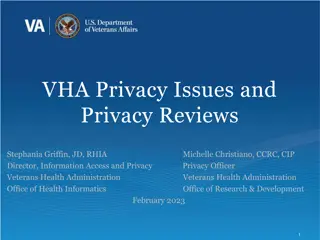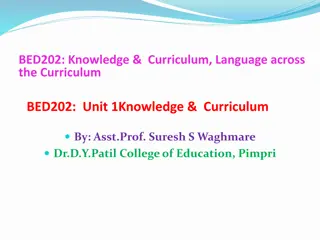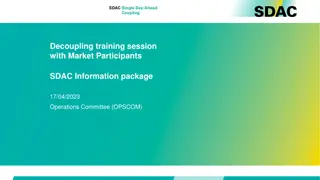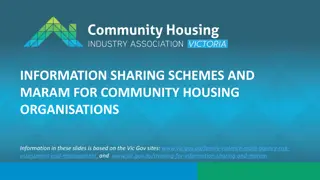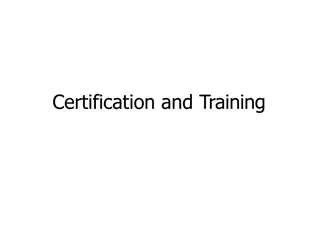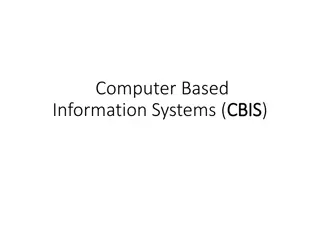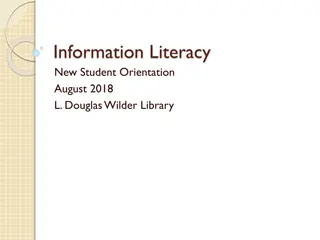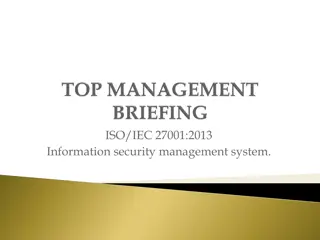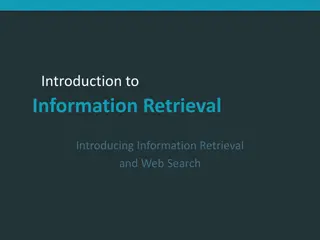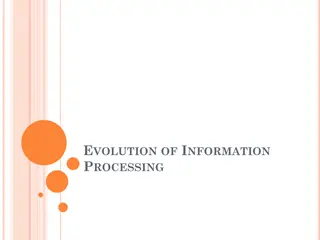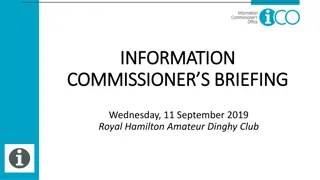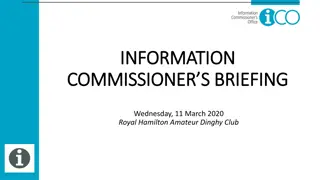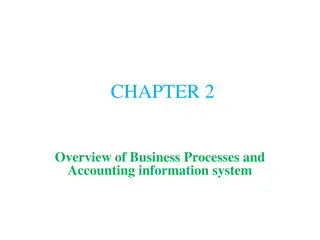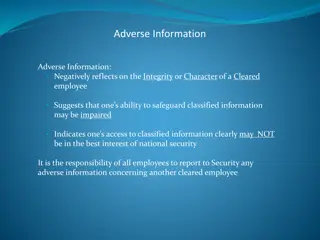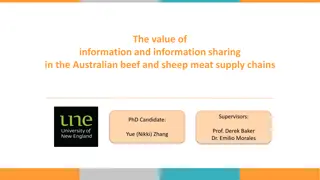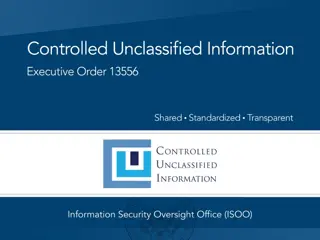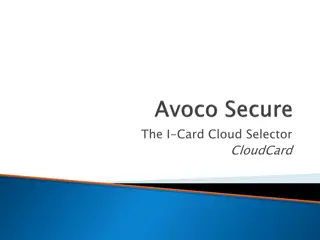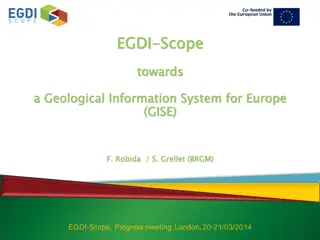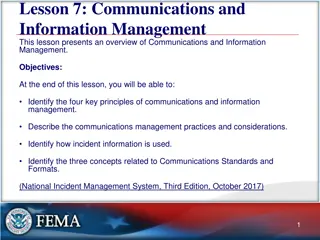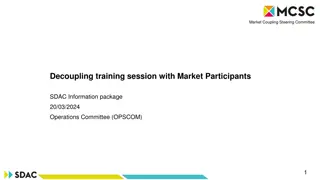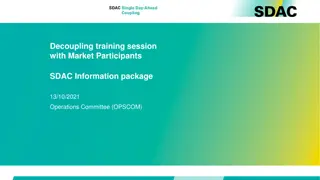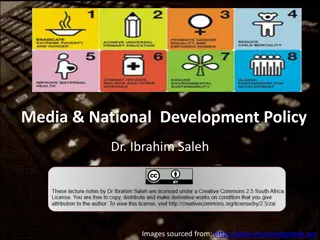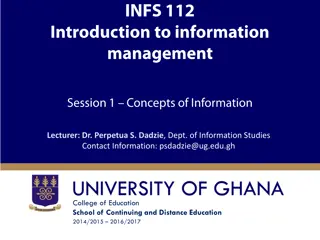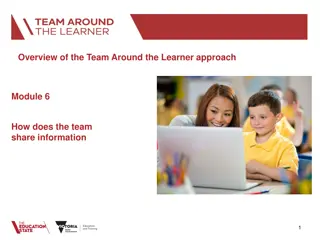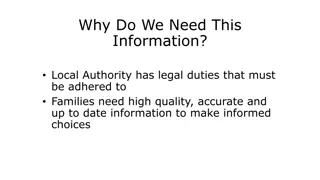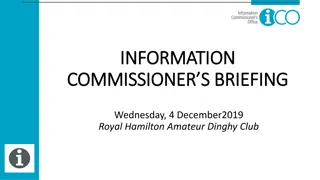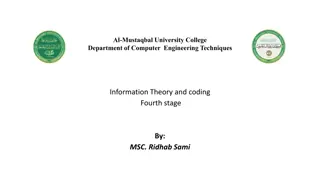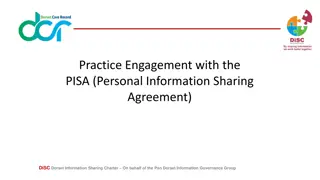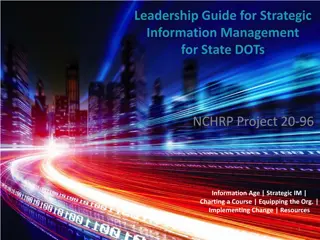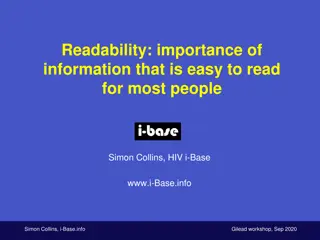The Role of SDAC in DMC Meetings
SDAC (Statistics and Data Analysis Center) plays a crucial role in DMC (Data Monitoring Committee) meetings by preparing and presenting safety and efficacy reports for review. The SDAC statistician collaborates with the trial statistician, produces reports, presents closed reports, and provides addi
7 views • 61 slides
Understanding Information Systems in Organizational Management
Management in organizations is divided into three levels: operational, tactical, and strategic. Each level requires different information systems to support various activities. Operational systems focus on routine transactions and control processes, while middle-level systems aid in semi-structured
8 views • 39 slides
Understanding VA Privacy Issues and Sensitive Information
Explore the complex landscape of VA privacy issues, including data relationships, sensitive personal information (SPI), personally identifiable information (PII), individually identifiable information (III), and individually identifiable health information (IIHI). Learn about the roles and responsib
0 views • 29 slides
Understanding Data, Information, Knowledge, and Curriculum in Education
Data is raw facts and figures, information is interpreted data with meaning, and knowledge is the accumulation of facts and information. The nature of knowledge involves acquiring information from real-life experiences and education. This content delves into the distinctions between data, informatio
0 views • 64 slides
Market Decoupling Training Session with SDAC Information Package
Decoupling training session organized for market participants to prepare for handling a full decoupling scenario in the SDAC market. The session includes background information, goals, scenario simulation, operational processes, coordination, evaluation, and fallback solutions. Date and timeslot set
2 views • 10 slides
Understanding Information Centres: Types and Organization
Modern libraries are evolving into information centres, offering precise information to users. They bridge the gap between user needs and available information. Information centres play a crucial role in providing timely and relevant information, aiding in decision-making and preventing duplication
0 views • 28 slides
Information Sharing Schemes and MARAM for Community Housing Organizations
These slides provide insights on information sharing schemes and the MARAM framework designed for community housing organizations to promote the wellbeing and safety of children, assess family violence risks, and enhance collaboration across service sectors. The Child Information Sharing Scheme (CIS
1 views • 15 slides
Inter-Cluster Coordination and Information Management in Humanitarian Emergencies
Inter-Cluster Coordination and Information Management play vital roles in humanitarian emergencies. The coordination mechanism involves regular meetings convened by the RC/HC and coordinated by OCHA, providing opportunities for clusters to collaborate on shared planning, needs assessments, and poole
2 views • 13 slides
Certification and Training in Information Security
This content covers various aspects of certification and training in the field of information security, including organizational information security outlines, positions in information security personnel, and professional certifications from renowned organizations. It also provides insights into dif
0 views • 18 slides
Understanding Computer-Based Information Systems (CBIS)
Computer-Based Information Systems (CBIS) transform raw data into valuable information to support decision-making, coordination, and control. CBIS utilize computers to collect, process, analyze, and distribute information efficiently. Data is the raw material, while information is the processed data
0 views • 27 slides
Understanding Information Literacy: A Comprehensive Guide for Students
Information literacy is crucial for academic success. It involves the ability to recognize the need for information, locate relevant sources, evaluate their credibility, and effectively use the information for research and presentations. Primary and secondary sources play a vital role in gathering i
0 views • 19 slides
Understanding ISO/IEC 27001:2013 Information Security Management System
Overview of ISO/IEC 27001:2013 standard for information security management system (ISMS). Learn about the importance of protecting information assets, preserving confidentiality, integrity, and availability of information, and steps to certification. Enhance understanding of different types of info
0 views • 35 slides
Introduction to Information Retrieval and Web Search
Information Retrieval (IR) involves finding unstructured material, typically text documents, within large collections stored on computers to satisfy information needs. This process extends beyond web search to include email search, corporate knowledge bases, and legal information retrieval. The text
0 views • 53 slides
Evolution of Information Processing in Computerization
Evolution of information processing from raw data to useful information through computerization. Data is collected, processed, and converted into valuable insights for decision-making. The growth of complexity led to the development of Information Technology, enabling efficient creation, processing,
0 views • 7 slides
Information Commissioner's Briefing at Royal Hamilton Amateur Dinghy Club
The Information Commissioner's Briefing held at Royal Hamilton Amateur Dinghy Club covered topics related to the Public Access to Information Act in Bermuda. The briefing emphasized the rights of Bermudians and residents to access public records, the role of the Information Commissioner in promoting
0 views • 51 slides
Information Commissioner's Role in Bermuda's Public Access to Information
The Information Commissioner in Bermuda plays a crucial role in promoting public access to information, ensuring compliance with the PATI Act, and safeguarding the right to access public information. This independent office provides guidance to public authorities, oversees enforcement activities, an
0 views • 37 slides
Understanding Business Processes and Accounting Information Systems
This chapter provides an overview of essential business activities, decisions, and information required for organizational operations. It discusses the role of the data processing cycle in organizing activities and supplying information to users. Various types of information needed for decision-maki
0 views • 62 slides
Understanding Adverse Information Reporting in National Security
This detailed content covers the importance of reporting adverse information regarding cleared employees in national security settings. It outlines the impact of adverse information on security clearances, the 13 adjudicative guidelines used in determining eligibility for sensitive duties, NISPOM re
0 views • 15 slides
Enhancing Information Sharing in Australian Meat Supply Chains
This research delves into the value of information and information sharing within the beef and sheep meat supply chains in Australia. It explores the benefits of improved decision-making, reduced costs, and enhanced supply chain performance through strategic information sharing. The study also ident
1 views • 21 slides
Centralized Unified Information Program Overview
The Centralized Unified Information (CUI) Program aims to establish a uniform system for safeguarding and disseminating unclassified information across executive departments and agencies. Executive Order 13556 mandated the program to address the patchwork of policies present, promoting clarity, cons
2 views • 16 slides
Avoco's Cloud-Based Information Card Selector: Enhancing Usability and Security
Avoco's Cloud-Based Information Card Selector is a leap forward in Information Card usability, offering benefits such as universal access to Information Cards, zero footprint for end users, and enhanced security features. The platform allows for easy creation, import, and backup of cards, as well as
0 views • 29 slides
Geological Information System for Europe: EGDI-Scope Progress Meeting 2014
Toward a Geological Information System for Europe (GISE), the EGDI-Scope project aims to support European Commission policies on mining wastes, Water Framework Directive (WFD), INSPIRE, biodiversity, water, air, and geology. By organizing an information system instead of a data infrastructure, it pr
0 views • 11 slides
Principles of NIMS Communications and Information Management
Effective emergency response relies on maintaining situational awareness through constant flow of information. This lesson covers key principles including interoperability, reliability, scalability, and portability for communication and information management in incidents. It emphasizes the need for
0 views • 27 slides
Market Coupling Steering Committee Decoupling Training Session
The Market Coupling Steering Committee is organizing a training session on full decoupling of the Single Day-Ahead Coupling (SDAC) system. The session will simulate scenarios, operational processes, fallback solutions, coordination, and evaluation methods. Participants will engage in a detailed oper
0 views • 10 slides
Decoupling Training Session with Market Participants: SDAC Information Package
This training session focuses on preparing all operational parties involved in the SDAC market for a potential day-ahead market decoupling incident. Organized to simulate a full decoupling scenario, the session aims to ensure that all participants are well-equipped to handle such situations effectiv
0 views • 11 slides
Challenges and Solutions in Information Literacy and Technology Development
The provided content delves into the critical topics of information literacy, digital ethics, and the equitable distribution of benefits from information and communication technologies. It emphasizes the need to address the hidden curriculum in education, improve information literacy skills, and und
0 views • 21 slides
Understanding Data, Information, and Knowledge in Information Studies
Data, information, and knowledge play vital roles in our lives and are essential in information studies. Dr. Perpetua Dadzie explores the definitions and distinctions among data, information, and knowledge, emphasizing the transformation process that turns raw data into meaningful information. The s
0 views • 23 slides
Information Systems in Organizations: Overview and Implementation
Information systems play a crucial role in organizations, encompassing transaction processing systems, functional area information systems, and enterprise resource planning systems. This content delves into the purpose of transaction processing systems, the support provided by information systems ac
0 views • 30 slides
Year 2 Home Learning English: Information Reports on Tigers
Week 2 of English spring home learning for Year 2 students focuses on information reports about tigers. The student activities involve watching videos, researching tiger facts, organizing information using maps, retrieving information, and identifying features of an information text. Miss Toole guid
0 views • 18 slides
Understanding Information Sharing in the Team Around the Learner Approach
This module focuses on how the team shares information in the Team Around the Learner approach, emphasizing legal and professional considerations. It covers collecting, storing, and using information effectively to support the learner, family, and team members. Information sharing plays a crucial ro
0 views • 9 slides
Importance of Providing Information in Childcare Services
The local authority has legal duties to provide families with high-quality, accurate, and up-to-date information to make informed choices regarding childcare. The Childcare Act 2006 and Children and Families Act 2014 outline specific requirements for local authorities to offer information on childca
0 views • 4 slides
Information Commissioner's Briefing and Role Overview
The Information Commissioner's Briefing held at the Royal Hamilton Amateur Dinghy Club on December 4, 2019, covered various topics such as trade secrets, commercial interests, and contractual negotiations. The role of the Information Commissioner in promoting public access to information was highlig
0 views • 31 slides
Understanding the Role of Classified Information in Criminal Trials
In criminal trials, the handling of classified information is crucial and governed by specific rules. Defendants do not have an inherent right to access classified information, and there are procedures in place to determine its use in court. The rights surrounding secret evidence include protection
0 views • 43 slides
Freedom of Speech and Freedom of Information: Understanding the Differences and Coincidences
Freedom of Speech and Freedom of Information are essential human rights that allow individuals to express thoughts and receive truthful information. While Freedom of Speech pertains to the expression of ideas through various means, Freedom of Information involves the communication and reception of a
0 views • 9 slides
Understanding Information Entropy in Information Theory
Information entropy, a key concept in information theory, measures the average amount of information in a message. Source entropy and binary source entropy are explained with examples, along with maximum source entropy for both binary and non-binary sources. Learn how to calculate entropy for differ
0 views • 12 slides
Enhancing Information Sharing: DISC and PISA Benefits
DISC (Dorset Information Sharing Charter) and PISA (Personal Information Sharing Agreement) facilitate improved information sharing among healthcare organizations in Dorset. DISC establishes robust principles for managing data flow and promoting best practices in information governance, while PISA t
0 views • 8 slides
Leadership Guide for Strategic Information Management in State DOTs
This guide provides insights into maximizing the value of available information, enhancing efficiency in information collection and use, and improving organizational readiness. It addresses the evolving role of transportation agencies as facilitators of information and the significance of informatio
0 views • 27 slides
Importance of Readable Patient Information in Healthcare
Patient information plays a crucial role in healthcare, but the readability of this information is often overlooked. Simon Collins discusses how difficult text can create barriers to accessing healthcare and the importance of making patient information easy to understand. The talk emphasizes the nee
0 views • 37 slides
Decoupling Training Session with Market Participants SDAC Information Package
This training session aims to prepare operational parties and market participants for handling a day-ahead market decoupling incident in real operations and real-life conditions. The scenario includes full decoupling of SDAC, focusing on evaluating, coordinating, and reporting the process. The sessi
0 views • 11 slides
Selling Information to Budget-Constrained Buyers
The images and descriptions discuss the concept of selling information through consulting, focusing on marketing, consumer information, and credit reports. Motivations for targeting budget-constrained buyers and the optimal mechanisms for selling information are explored. The content highlights mode
0 views • 26 slides


